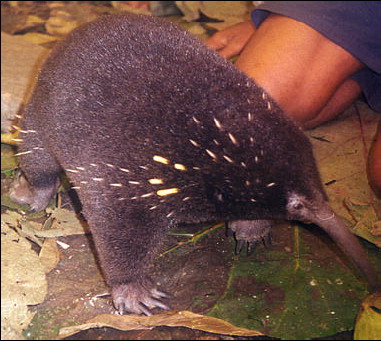|
| 질의: monotremata | 결과: 15번째/17 | |
Long-beaked Echidna (Zaglossus bruijni) - fact sheet
| 제목: | Long-beaked Echidna (Zaglossus bruijni) - fact sheet
| |

| 해상도: 381x341
파일크기: 54677 Bytes
촬영일: 2007:01:16 10:04:10
등록시간: 2007:01:16 10:23:15
|
LONG-BEAKED ECHIDNA
Zaglossus bruijni
DESCRIPTION
Class: Mammalia
Order: Monotremata
Family: Tachyglossidae
The long-beaked echidna is a monotreme or egg laying mammal and is found only in New Guinea, although it is well represented in fossil deposits throughout Australia.
Very little is known about this echidna’s life history as few studies have ever been undertaken. It is a very large, variably furred echidna although the spines barely show through, except on the flanks. There is also a great deal of variation in length and distribution of spines, particularly evident in animals from different parts of the country. There may actually be two species of Long-beaked Echidna. The hairs of this animal are brownish or black and sometimes almost hide the spines on the back; the underparts are usually spineless. The spines range in colour from white and light grey to solid black.
The Long-beaked Echidna has a much longer and more downcurved bill than its Australian counterpart, the Short-beaked Echidna. This is probably related to diet because the Long-beaked Echidna feeds mainly on earthworms deep in the soil, many of which are large.
The long-beaked Echidna usually weighs 5-10 kilograms and the head and body length is about 450-775mm, with the tail being only a slight projection. It is primarily nocturnal and forages on the forest floor.
HABITAT
The Long-beaked Echidna is widespread in New Guinea, having been reported from the western and eastern extremities of the island. It is absent however, from northern coastal plains and from most of northern New Guinea at altitudes below 1,200m elevation as well as the southern lowlands. It is mainly found in humid montane forests and may occur in alpine meadows at an elevation of 4,000m.
STATUS
Although the Long-beaked Echidna is defined endangered it is avidly hunted for food in New Guinea by natives using trained dogs. Because of such persecution, as well as loss of forest habitat to farming and logging, the echidna is disappearing in those areas accessible to humans.
DIET
The primary food of the Long-beaked Echidna is earthworms, although others very occasionally, have been recorded as eating ants and termites. The Long-beaked Echidna ingests earthworms buried in the muddy forest soil by hooking them with the “teeth” within the groove on its tongue. It is thought that the Short-beaked Echidna is more widely distributed because its principal food, ants and termites, are found over a larger area and in many more kinds of habitat.
REPRODUCTION
Data on the reproduction of this species of echidna is limited, but it is thought that the breeding season may be around March to July. The Longbeaked Echidna almost certainly lays eggs, carries the small offspring in a pouch and is said to have more than one offspring at a time, but rarely if ever more than two.
ADDITIONAL INFORMATION
Echidnas possess some remarkable features and perhaps the most striking of these is their extraordinarily large and complex brains and relatively high intelligence. They are also remarkably long lived with one Long-beaked Echidna having been kept in London Zoo for 30 years and eight months and another in the Berlin Zoo for 31 years.
The meat of the Long-beaked Echidna is relished by the people of New Guinea for its oiliness and although it is protected by both is protected by both the governments of Papua New Guinea and Indonesia, hunting by traditional methods is still allowed.
Source:
© Zoological Parks and Gardens Board of Victoria 2004.
http://www.zoo.org.au
http://www.zoo.org.au/education/factsheets/mam-longbeak_echidna.pdf
|
댓글 |
|---|
| | 손님 |
|
| 1234 |
| | 손님 |
|
| it ugly |
| | 손님 |
|
| ewwwwwwwwwwwwwwwwwwwwwwwwwwww that ugly |
^o^
동물그림창고 똑똑전화 누리집
^o^
|
|
|